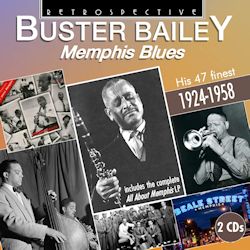 BUY NOW AmazonUK AmazonUS |
BUSTER BAILEY Memphis Blues; His 47 finest, 1924-58 |
CD 1
1. Dizzy Debutante
2. Afternoon In Africa
3. Santa Claus Blues 2.43
4. Jazzbo Brown From Memphis Town
5. Clarinet Marmalade
6. Yama Yama Blues
7. Church Street Sobbin’ Blues
8. Hocus Pocus
9. There’s A House In Harlem For Sale
10. Rug Cutters’ Swing
11. Wild Party
12. Call Of The Delta
13. Shanghai Shuffle
14. Stealin’ Apples
15. Blues In C Sharp Minor
16. Warming Up
17. They Can’t Take That Away From Me
18. More Than That
19. Rhythm, Rhythm
20. I Know That You Know
21. Sloe Jam Fizz
22. Planter’s Punch
23. Lorna Doone Shortbread
24. Chained To A Dream
25. Light Up
26. Man With A Horn Goes Berserk
27. I’m Cuttin’ Out
CD 2
1. Limehouse Blues
2. Am I Blue?
3. Should I?
4. April In Paris
5. The Blue Room
6. Pinetop’s Boogie Woogie
7. Eccentric
8. Can’t We Be Friends?
9. St. Louis Blues
10. 9:20 Special
11. You Can Depend On Me
12. Tin Roof Blues
13. How Come You Do Me Like You Do?
14. Hatton Avenue And Gayoso Street
15. Bear Wallow
16. Beale Street Blues
17. Sunday Parade
18. Memphis Blues
19. Chickasaw Bluff
20. Hot Water Bayou
Memphis-born Buster Bailey (1902-67) played with the finest instrumentalists and singers – Louis Armstrong and Bessie Smith, Red Allen and Billie Holiday among them – in a recording career that stretched from 1924 to shortly before his death. He was known then as a member of Armstrong’s All-Stars, with whom he’d recorded a month before Bailey’s fatal heart-attack. He had known Armstrong for forty years, since their stint together in King Oliver’s band.
Bailey had a strong classical training which ensured his technique remained supremely virile to the end. He was also an adaptable player, stylistically, rather more so perhaps than, say, Albert Nicholas. This twofer covers the bands and styles he espoused throughout his career up to 1958, the year in which he recorded All About Memphis, the whole Felsted LP of which is included here; seven tracks in all.
Bailey recorded acoustically with The Red Onion Jazz Babies in 1924, and Santa Claus Blues is a famed example of his collaboration with Armstrong, followed by a date with Fletcher Henderson and Bessie Smith with a piece that would have seemed geographically performed for Bailey, Jazzbo Brown From Memphis Town. He wasn’t drenched in the blues lexicon as were Dodds and Bechet but nevertheless turns in a redoubtable solo here in daunting company. Given his relative youth he was moving in fast company by now; with Clarence Williams he teams up with Ed Allen, an unjustly overlooked trumpet player who turns in a splendid focused solo on Church Street Sobbin’ Blues, where Bailey doubles on alto sax, something he did infrequently. Red Allen’s was a name that was to feature in his recordings over the decades, either in Fletcher Henderson’s band or in the rump from it that Allen led. From the latter there are two special tracks, long admired, There’s A House In Harlem For Sale and Rug Cutters’ Swing.
It was around this time that his fluid virtuosity was becoming apparent and there’s a superbly arabesque-like logic to his soloing on Shanghai Shuffle, a piece from 1934 which he recorded with his own so-called Seven Chocolate Dandies (Allen, Higginbotham, and Benny Carter among them), despite the chronic dullness of the rhythm section. The single example of his accompaniment to Billie Holiday is balanced by his recording, a fortnight later, with cigar-chomping Stride God, Willie ‘The Lion’ Smith. He teams with Lionel Hampton and Johnny Hodges for a couple of tracks and happily we hear from his February 1938 Rhythm Busters for some tight, taut Kirby-styled ensemble (but then, after all, it was in effect the Kirby band under Bailey’s name). The Rhythm Busters was a different line-up and the three tracks are all Bailey compositions including his famous carve-up on Tiger Rag, called Man With A Horn Goes Berserk where he plays with ultra-virtuosity.
Bailey’s 1940 sextet with Charlie Shavers and Russell Procope in the front line was a Kirby ensemble as well but there was quite a bit of personnel shuffling in these 1940 small band sides for either the Vocalion or Variety labels, including pungent jump-style reboots with some examples of Bailey’s circular breathing technique. A personal favourite from around this time is Nine-Twenty Special where pianist Clyde Hart (another favourite) joins Kirby, Bailey and Shavers and confreres. An all-star gathering for Capitol in 1945 saw Bailey join Bill Coleman, Carter, Hawkins, Nat King Cole and an august rhythm team of Oscar Moore, Kirby and Max Roach. Fast company indeed. There’s a long gap from 1945 to a 1957 date with Red Allen and raunchy trombonist, big-boned Tyree Glenn. The Felsted LP seals the deal. The personnel formed a quartet or septet depending on whether Herman Autrey, Vic Dickenson and Hilton Jefferson sat out. Dickinson typified insouciance and drollery, but it’s good to hear Autrey, ex-Fats of course but now sporting a more up-to-date trumpet style, strongly centred in the mainstream. Bailey is thoughtful and relaxed, liquidity itself, or suddenly fast and furious depending on the tune and the context. He shows he’d forgotten nothing of the blues phrasing of three decades before in the two WC Handy tributes – poignant because, as a boy, he had briefly played in one of Handy’s bands.
With excellent notes and transfers this joins the roster of strongly recommendable restorations on this label.
Jonathan Woolf